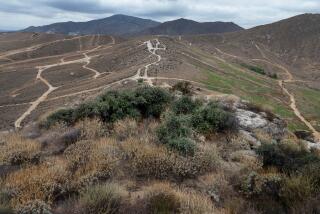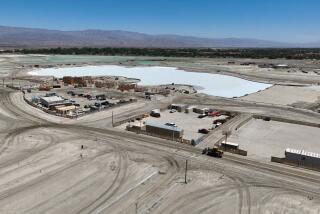Indian Band OKs 600-House Project on Reservation Land : Development: The project with Irvine-based Native American Development Corp. northeast of Escondido is expected to generate $100 million over 50 years.
Taking a cue from similar--and successful--ventures in the Palm Springs area, the San Pasqual Indian band of Mission Indians has announced construction of 600 manufactured houses on reservation land.
The housing project northeast of Escondido is the first on an Indian reservation in San Diego County. It is projected to generate $100 million in revenue--reflecting future, inflated dollars--for the Indians over the next 50 years.
“If this is managed right, we can’t lose,” said Dorothy Tavui, a member of the band’s business committee, which negotiated the agreement with the development company.
“The project will take advantage of the bad land that was given us years ago and allow us to do something with it,” she said. “We needed a boost, and I think we’ve gotten that boost.”
The plan calls for the Irvine-based private and for-profit Native American Development Corp. to lease 289 acres of Indian reservation land for 50 years and, in turn, to privately sublease it.
The company then will sell its own manufactured houses, to be chosen by the tenants from among the models offered for the 5,000-square-foot sites.
Described as affordable housing that will cost 75% of comparable housing elsewhere, the first phase of the project--above the northern shore of Lake Wohlford--is expected to be ready for occupancy by Christmas.
The $62-million project will process its own sewage and rely on local ground water.
The San Pasqual reservation covers 1,400 acres and is home to about 90 of the band’s 233 enrolled members.
The joint Indian-private project has the blessing of the federal Bureau of Indian Affairs, which notes that similar land leases with private developers are not uncommon around the country--from the upper Midwest to Washington state to Palm Springs. Indeed, half of the property on which the city of Palm Springs is situated is reservation land leased from the Agua Caliente Indian band of the Cahuilla Indians.
“Very few developers who have developed on Indian property have had any major problems,” said Terry Beckwith, director of the Bureau of Indian Affairs office in Palm Springs. “It’s been very successful.”
The deal between the Native American Development Corp. and the San Pasqual Indians has been in the works since 1987, said company President Don Wright. The 7-year-old firm, with 30 shareholders, has been pursuing such arrangements with several Indian reservations, and the San Pasqual pact is the most advanced, he said.
Indian Affairs approved the plan in 1989, and last week the company and San Pasqual Indian leaders publicly unveiled the project, called Lake Wohlford Highlands.
Wright said the 289 acres are just north of Lake Wohlford, east of Escondido and south of Valley Center, with 70% of the home sites affording lake views.
The sites will lease for an average of $425 a month over 10 years, and the manufactured houses--ranging from 1,500 square feet to 2,250 square feet--will cost from $80,000 to $100,000. Increases in lease payments will be tied to the consumer price index, Wright said.
“These homes, including lease payments, insurance, et cetera, will cost less than 75% of a comparable stick-built home,” Wright said. “I’m already talking to a fellow in Orange County who is interested in four lots--one for himself, and the others for his daughters.”
The development will also feature a clubhouse, tennis courts, swimming pools and similar amenities, and will be marketed primarily to retirees and other “empty-nesters,” he said.
The San Pasqual Indians have waived their sovereign immunity during the term of the lease so that any legal problems connected with the development can be adjudicated in state courts, Wright said.
“In Southern California, this is the first residential land development outside of Palm Springs involving Indian land,” Wright said. “Others deal in bingo or sand-and-gravel type operations.”
Tavui said the San Pasqual band had previously considered other commercial operations, including developing a Christmas tree farm.
“We’re always looking for something because the whole idea for us is to be self-sufficient and not have to go to the BIA all the time, asking for help,” she said. “There’s still a lot of people out there who don’t want you (Indians) to succeed, but they don’t want you asking for help, either.”
The partnership with the Irvine firm, she said, “is offering us something that we could never do by ourselves. We have that whole hillside up there with that beautiful view, but it was virtually impossible to develop unless an individual Indian had a lot of money. We knew the BIA wouldn’t come in and build houses.”
Part of the agreement with the Native American Development Corp., she said, was the company’s promise to train and hire San Pasqual Indians for construction and other jobs as the project got under way.
In San Diego County, the nearby La Jolla band operates a water slide park and campground at the base of Palomar Mountain, and the neighboring Rincon reservation is developing an Indian-run agricultural business.
More to Read
Sign up for Essential California
The most important California stories and recommendations in your inbox every morning.
You may occasionally receive promotional content from the Los Angeles Times.










